A 2025/26-os tanévben is elérhető a Merülj velünk! interaktív edukációs program. Érdeklődés, jelentkezés esetén kérjük keressenek minket telefonon vagy emailben a lenti elérhetőségeken.

Nagy öröm számunkra, amikor első kézből kapunk visszajelzést arról, milyen élményt jelent a Merülj velünk! program a gyerekeknek és a pedagógusoknak. Ezúttal Eszter tanár néni osztotta meg velünk diákjai gondolatait. Íme a gyerekek őszinte visszajelzései:
"Egyöntetűen azt mondták, hogy a VR szemüveges lehetőség fantasztikus volt! Sokan még életükben nem találkoztak ezzel a technikával és lenyűgözőnek tartották. Sokan mondták, hogy szintén nagy élmény volt számukra, hogy megfoghatták az általatok hozott dolgokat, legfőképp a cápát. Az előadásnál külön kiemelték, hogy nagyon-nagyon színes és nagyon-nagyon érdekes volt, nagyon tetszett nekik, hogy gyerekek is megszólaltak. Azt szintén elmondták, hogy csupa olyan dolgot hallottak, amiről eddig soha vagy csak nagyon keveset, így nem okozott gondot nekik, hogy figyeljenek. Volt aki azt is megfogalmazta, hogy neki az tetszett a legjobban, hogy teljes mértékben nekik szólt. Az ő nyelvükön, szintjükön, érdeklődési körüknek megfelelően szóltatok hozzájuk.
Egyöntetűen azt mondták, hogy legalább még egy órát tudták és szerették volna hallgatni, nézni, "tapogatni" az előadást.
Összességében mindenki azt a visszajelzést adta, hogy az egyik legfantasztikusabb előadás volt amit valaha hallottak, láttak... És ami még fontos, hogy nemcsak a gyerekek, de a sokat látott "öreg róka" kollégák is teljesen le voltak nyűgözve. "
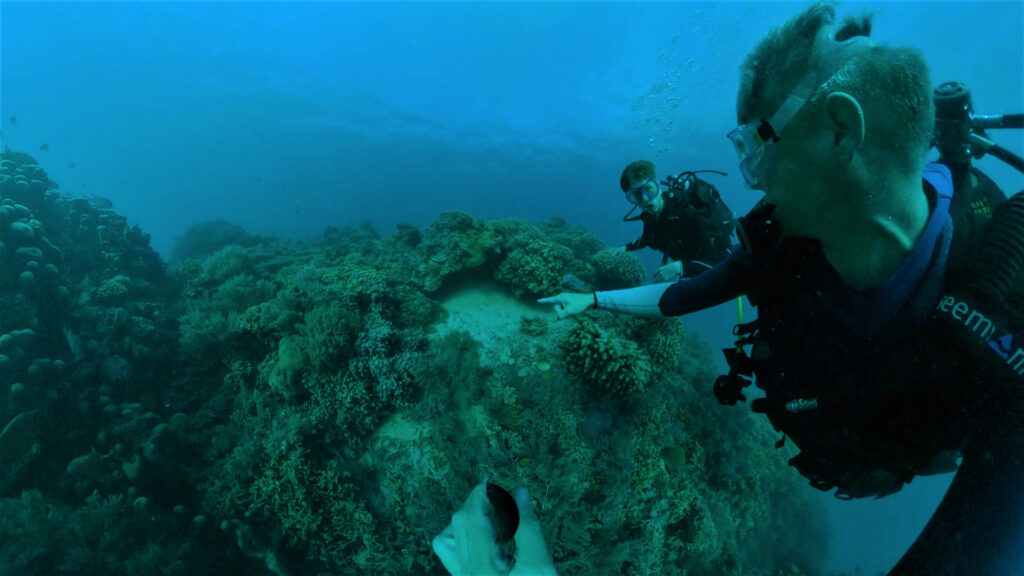
„MERÜLJ VELÜNK!”
Edukációs program általános iskolai tanulók részére.
Mélytengeri merülés a környezetismeret, természetismeret vagy biológia órán?
Velünk lehetséges!
Veszünk egy mély levegőt és lemerülünk a korallok, ráják, teknősök és cápák világába. Megtudhatod, milyen veszélyek fenyegetik ezeket a csodálatra méltó állatokat és mit tehetünk a fennmaradásuk érdekében.

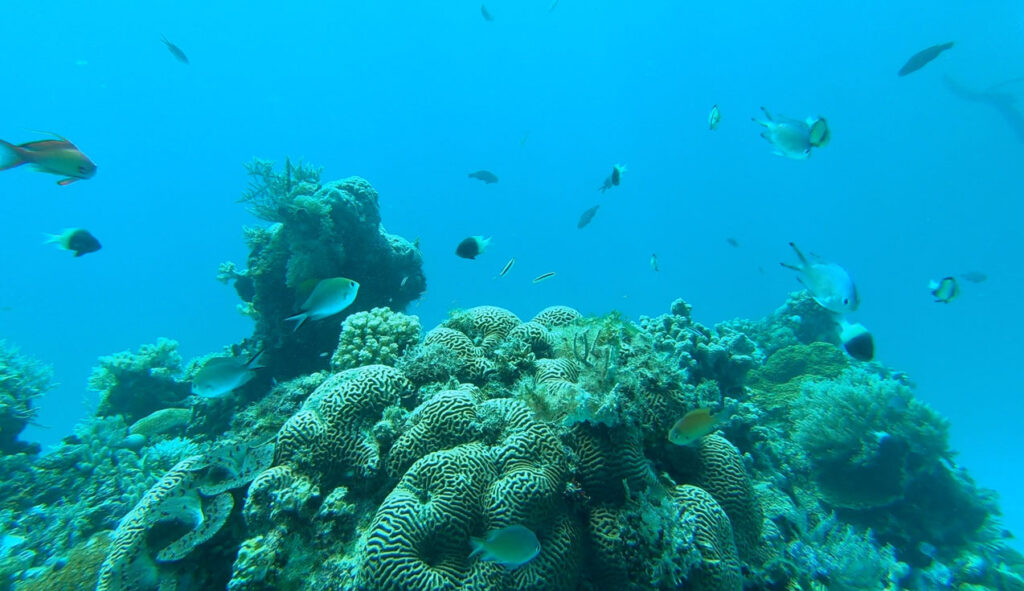
– Korall – állat vagy növény?
– Tudod-e miből van a tengerpart finom homokja?
– Miért húznak éjszakára pizsamát a papagájhalak?
– Hogyan tudnak üzenetet küldeni egymásnak a korallok?
– Miként üzemel a víz alatti wellness? – fogmosás, testápolás, manikűr és pedikűr a korallzátonyon.
– Kiderítjük azt is, hogy a tengerifű-mezők és mangróve erdők mennyi szén-dioxidot nyelnek el és milyen módon járulnak hozzá földünk megőrzéséhez.

Föld napja, Víz világnapja, Óceánok világnapja, Környezetvédelmi világnap, Földünkért világnap - sok-sok kapcsolódási pont egy igazán aktuális témához.
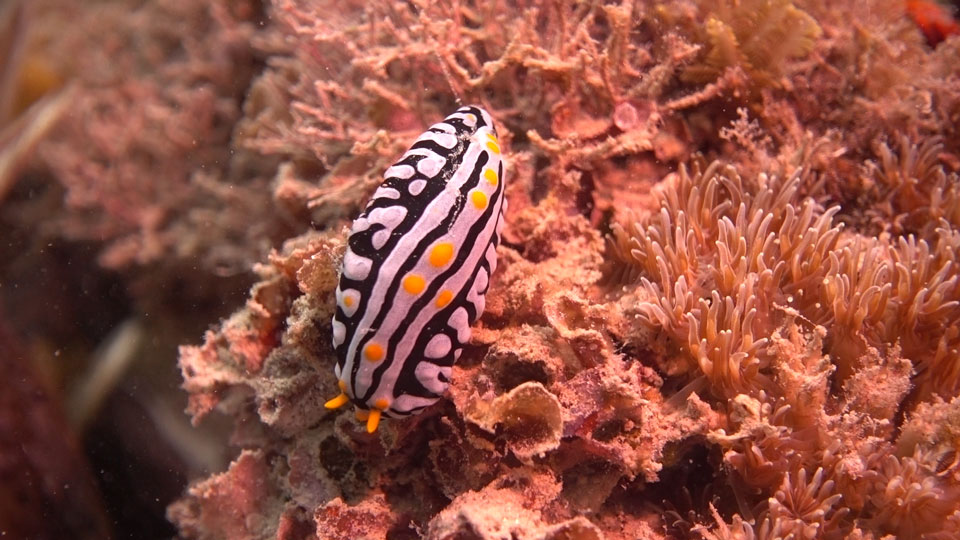
A Kids for the Oceans Egyesület azzal a céllal alakult meg, hogy a jövő nemzedékét megismertesse az óceánok élővilágát fenyegető veszélyekkel. Szakmai vezetőnk, Karáth Emil biológus-ökológus. Bár nincs közvetlen földrajzi kapcsolatunk tengerhez vagy óceánhoz, mi mégis fontosnak tartjuk, hogy a fiatalok megismerjék a víz alatti világot. Földünk ¾-ét óceánok, tengerek borítják, ezért nem is Földnek kellene hívni a bolygót, hanem víznek. A tengeri élővilág negyede található a korallszirteken. Ezt a csodás ökoszisztémát mutatjuk be a diákoknak.
Mélyen hiszünk abban, hogy a gyerekek és fiatalok érzékenyítésével elérhetjük célunkat.
Ezért edukációs programot indítunk az általános iskolás tanulók számára. Ezek az egy tanórás edukációs előadások hiánypótlók, hiszen ezekről az ökológiai folyamatokról egyáltalán nem, vagy csak nagyon keveset tanulnak a gyerekek az iskolában. A víz alatti ökoszisztémák jelentős szerepet játszanak a klímaváltozás lassításában, a széndioxid mennyiségének csökkentésében a légkörben. Fontosnak tartjuk, hogy a tanulók naprakész, friss információkhoz juthassanak a fenntarthatóság és környezetvédelem témáiban. A 45 perces foglalkozások végén a gyerekek egyedülálló módon nyerhetnek bepillantást a tengerek világába: az előadás végén VR szemüvegek segítségével merülhetnek velünk a tengerek mélyére. Ezzel az újszerű megoldással sok olyan tanuló kerülhet virtuálisan testközelbe a tengeri élővilággal, akik egyébként nem tehetnék ezt meg.
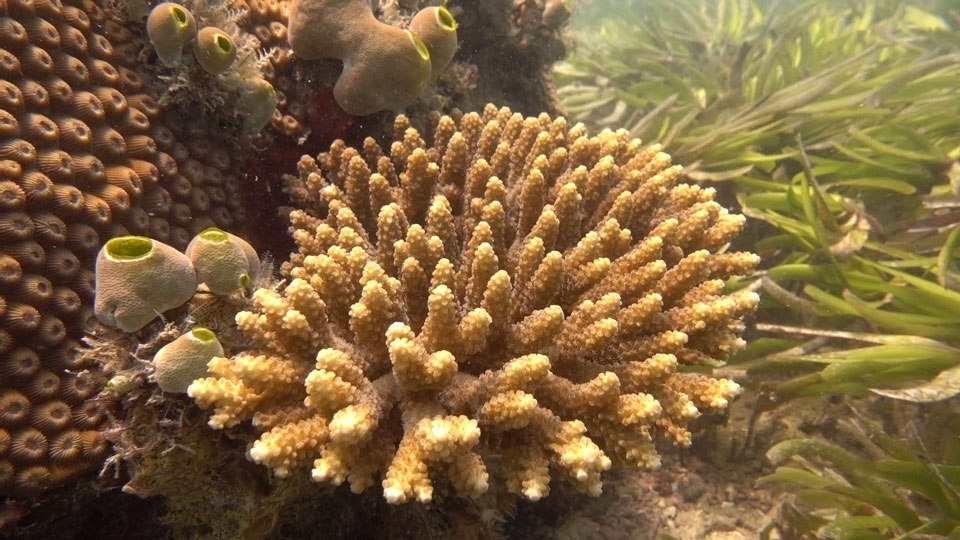
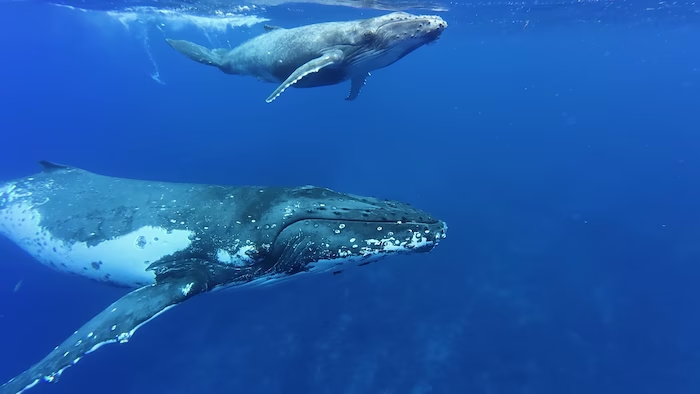
BÁLNÁK
A bálnák a bolygónk ŐREI. Különleges tengeri emlősök, akik nagyon intelligensek, és fontos szerepet játszanak az óceánok életében.
– Te tudod, hogyan alakultak ki a bálnák?
– Hallottál már arról, hogy korábban a szárazföldön éltek?
– Ki is volt a Basilosaurus?
– Ismered a hosszúszárnyú bálnákat?
– Tudod hány kilométert úsznak vándorlásuk során?
– Hallottad már a bálnák énekét?
– Hogyan óvja a mama bálna kis borját és figyel rá minden pillanatban?
– Azt tudod-e, mihez hasonlít a bálna anyateje?
– Vajon hány percet bírnak a vízben egy lélegzetvétellel?
– Milyen veszélyek fenyegetik ezeket a hatalmas, békés óriásokat?
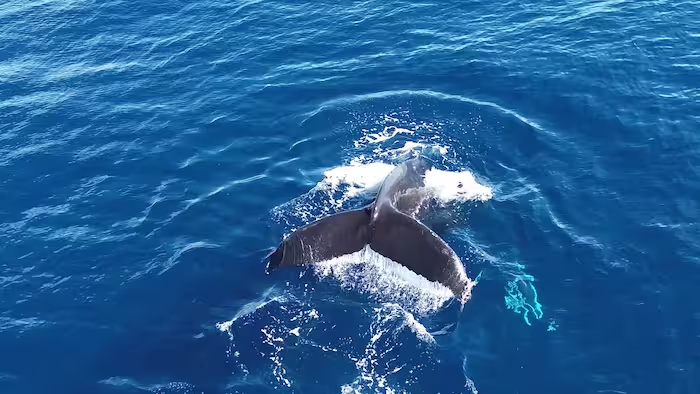
A Bálnákról szóló rész előadásának anyagához és a VR film elkészítéséhez Francia Polinéziába utaztunk, hogy testközelből tudjuk őket filmezni és megfigyelni. Ennek a csodás útnak az összefoglalóját olvashatjátok itt:
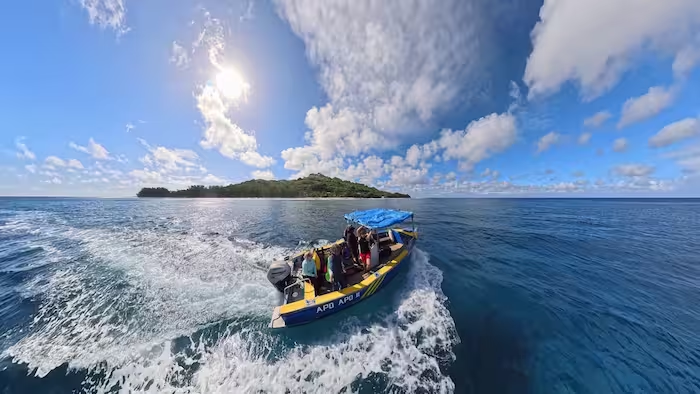
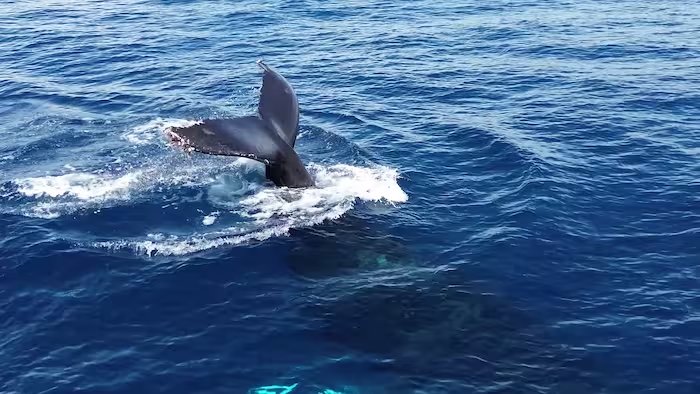
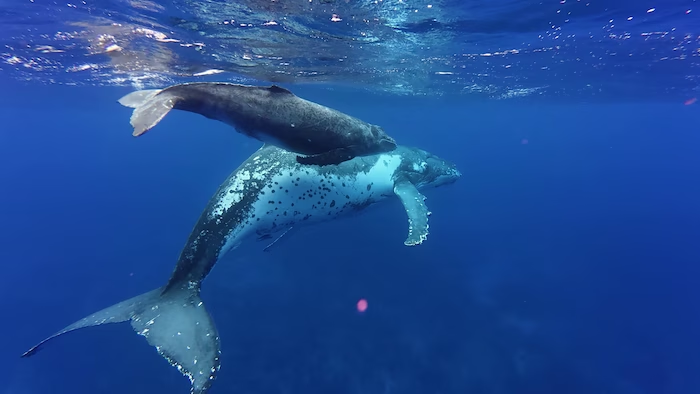
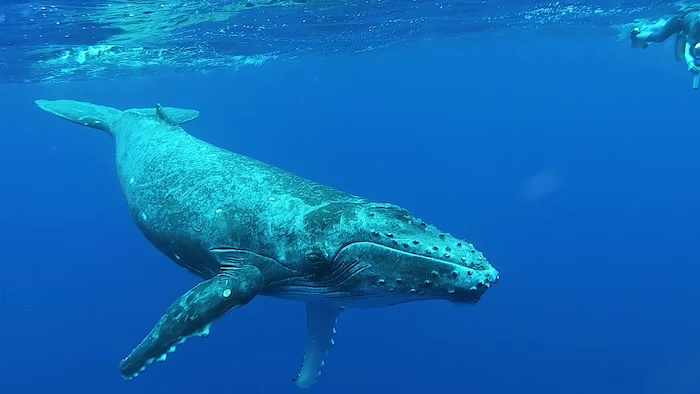
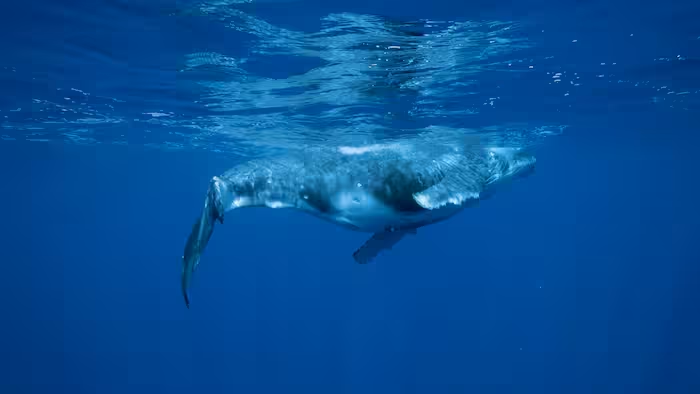
Hazatértünk háromhetes utunkról, Francia Polinézia varázslatos szigeteiről – tele élményekkel, emlékekkel és kalandokkal. Utazásunk célja a hosszúszárnyú bálnák megfigyelése volt, de végül sokkal többet kaptunk egy egyszerű expedíciónál.
Hihetetlen pillanatoknak lehettünk tanúi: anyabálnák és pár hetes borjaik békés együttúszásának, játékos mozdulatainak, finom jelzéseinek. Minden egyes találkozás egy külön történet volt.
Napi 8 órát töltöttünk az óceánon, bálnákat keresve és filmezve. Volt, amikor szerencse kísért minket, és testközelből láthattuk ezeket a lenyűgöző óriásokat, de akadt olyan délelőtt is, amikor hiába kutattuk a horizontot, nem bukkantak fel.
A megfigyelt bálnákat adatbázisba gyűjtöttük, ezzel támogatva Michael Poole professzor munkáját, aki 1987 óta kutatja a Francia Polinézia vizeiben élő bálnákat és delfineket, és elképesztően gazdag katalógust épített fel a fényképekkel azonosított egyedekből. A katalógust az Oregon State University Hatfield Marine Science Centerében kezelik.
Minden bálnának saját „útlevél” készül – a farok alsó részéről készült fotó az ujjlenyomatuk. És ahányszor ugyanazt az egyedet újra látjuk, vagy más kutatók megfigyelik, egy újabb „pecsét” kerül bele.
Ez a módszer segítette bizonyítani, hogy néhány „ismerősünk” bejárja a Csendes-óceán déli részének szaporodóhelyeit: jártak már a Cook-szigeteken, Samoán, Tongán, Új- Kaledóniában, sőt a Dél-Amerika nyugati partján élő populációval is van átfedés. Szinte minden egyedet azonosítottak az Antarktisz fontos táplálkozóhelyein is.
Többször sikerült rögzítenünk a bálnák énekét is. A hosszúszárnyú bálnák éneke a természet egyik leglenyűgözőbb és legösszetettebb hangjelensége. Ezek a hangok nem csupán zajok – komplex, ismétlődő mintázatokat alkotnak, amelyeket a hím bálnák „énekelnek”, főként a párzási időszakban.
Csak a hím hosszúszárnyú bálnák énekelnek és valószínűleg a párzással kapcsolatos kommunikáció – a nőstények csalogatása vagy a hímek közötti versengés jele. Egy ének 20–40 percig tarthat, és órákon át ismétlődhet.
A bálnaéneket hierarchikusan szervezett egységek alkotják:
- Hang: egyetlen hang vagy motívum.
- Frázis: néhány hangból álló rövid szakasz.
- Téma: ismétlődő frázisok csoportja.
- Dal: több téma sorozata, ami ciklikusan ismétlődik.
A dalok idővel fokozatosan változnak, de ugyanazon populáció hímjei mindig ugyanazt a verziót éneklik egy adott szezonban — ez egyfajta „kulturális tanulás”, ami ritka az állatvilágban. A hangok akár több tíz kilométerre is elhallatszanak az óceánban.
A bálnák megfigyelését szigorú előírások szabályozzák. Kevés olyan hely van a világon, ahol megengedett, hogy együtt úszhassunk ezekkel az óriásokkal. Hajóval legfeljebb 100 méterre lehet megközelíteni őket, így sokszor több száz métert kellett úsznunk a nyílt óceánban, hogy utolérjük a bálnákat. A nyugalmuk védelmében csak szabad tüdővel lehet velük úszni – a francia hatóságok ezt rendkívül komolyan veszik, ezért minden nap volt egy hivatalos kísérőnk a hajón, aki a szabályok betartását felügyelte.
A Csendes-óceánon töltött hetek ugyanakkor sok kihívást is tartogattak. Az időjárás gyakran próbára tett bennünket – erős szél, eső, hullámzás –, de minden nehezített körülmény csak még különlegesebbé tette az élményt. A víz alatti technika és a 360°-os kamerák használata is komoly feladat volt, hiszen az erős áramlatokban és a mély vízben nem volt kockázatmentes a technika kezelése. Mindez azt a célt szolgálta, hogy a Merülj velünk! edukációs programunk következő része újabb izgalmas VR-élménnyel és látványos képanyaggal bővülhessen.
És ha már Francia Polinéziában jártunk, nemcsak Rurutu szigetén töltöttünk hosszú napokat, hanem bejártuk Tahiti, Moorea és Bora Bora szigeteit is. Lenyűgözött minket a természet szépsége – a vulkanikus hegyek buja zöldje, a türkiz lagúnák fénye, és persze a víz alatti élővilág sokszínűsége. Úsztunk sasrájákkal, fekete foltos szirtcápákkal, citromcápákkal, dajkacápákkal és megszámlálhatatlanul sok korallszirti hallal.
Életre szóló kaland volt – egyszerre tudományos, természetközeli és mélyen emberi élmény. Most azon dolgozunk, hogy ezt az élményt már a diákok is átélhessék.

Az ismeretterjesztő óra hossza 45 perc, melynek első része előadásból áll, másik részében a tanulók VR szemüvegeken keresztül „merülnek velünk”, láthatják a víz alatti világot.
A VR szemüveg segítségével arra fordítod a fejed, amerre akarod. Azt nézel éppen, amit szeretnél. Bármerre nézhetsz, nincsenek korlátok és nincs „csak előre”. Kedvedre gyönyörködhetsz a korallszirt világában, amit 360 fokban látsz.
Technikai szükséglet:
- Áramellátás
- WIFI
- Projektor
- Vetítővászon (vagy sima falfelület)
A program ára
2,500 Ft/diák

„MERÜLJ VELÜNK!”
Edukációs program középiskolák diákok számára.
Mélytengeri merülés a környezetismeret, természetismeret vagy biológia órán?
Velünk lehetséges!
Veszünk egy mély levegőt és lemerülünk a korallok, ráják, teknősök és cápák világába. Megtudhatod, milyen veszélyek fenyegetik ezeket a csodálatra méltó állatokat és mit tehetünk a fennmaradásuk érdekében.


– Te tudod, hogyan alakultak ki a korallzátonyok?
– Mik is tulajdonképpen a korallok?
– Vajon hány féle korall létezik?
– A szimbiózis melyik fajtája jellemző a korallok és az algák között?
– Milyen jelentősége van a korallszirteknek?
– Hallottál már arról, hogy a rákellenes szerek közel fele tenegri élőlényből származik?
– Melyik zátonytípus látható még az űrből is?

Föld napja, Víz világnapja, Óceánok világnapja, Környezetvédelmi világnap, Földünkért világnap - sok-sok kapcsolódási pont egy igazán aktuális témához.

A Kids for the Oceans Egyesület azzal a céllal alakult meg, hogy a jövő nemzedékét megismertesse az óceánok élővilágát fenyegető veszélyekkel. Szakmai vezetőnk, Karáth Emil biológus-ökológus. Bár nincs közvetlen földrajzi kapcsolatunk tengerhez vagy óceánhoz, mi mégis fontosnak tartjuk, hogy a fiatalok megismerjék a víz alatti világot. Földünk ¾-ét óceánok, tengerek borítják, ezért nem is Földnek kellene hívni a bolygót, hanem víznek. A tengeri élővilág negyede található a korallszirteken. Ezt a csodás ökoszisztémát mutatjuk be a diákoknak.
Mélyen hiszünk abban, hogy a diákok érzékenyítésével elérhetjük célunkat.
Ezért edukációs programot indítunk a középsikolás diákok számára. Ezek az egy tanórás edukációs előadások hiánypótlók, hiszen ezekről az ökológiai folyamatokról egyáltalán nem, vagy csak nagyon keveset tanulnak a diákok az iskolában. A víz alatti ökoszisztémák jelentős szerepet játszanak a klímaváltozás lassításában, a széndioxid mennyiségének csökkentésében a légkörben. Fontosnak tartjuk, hogy a tanulók naprakész, friss információkhoz juthassanak a fenntarthatóság és környezetvédelem témáiban.

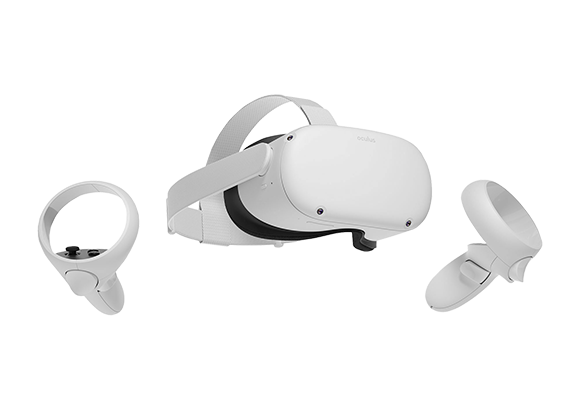
A 45 perces foglalkozások végén a diákok egyedülálló módon nyerhetnek bepillantást a tengerek világába: az előadás végén VR szemüvegek segítségével merülhetnek velünk a tengerek és óceánok mélyére.
Ezzel az újszerű megoldással sok olyan tanuló kerülhet virtuálisan testközelbe a tengeri élővilággal, akik egyébként nem tehetnék ezt meg.
Technikai szükséglet:
- Áramellátás
- WIFI
- Projektor
- Vetítővászon (vagy sima falfelület)
A program ára
2,500 Ft/diák
Karáth Emil biológus, a Kids for the Oceans egyesület alapítója, elnöke, szakmai vezetője:
Szenvedélyesen szereti a tengeri élővilágot, tapasztalt búvár, válogatott, többszörös világ- és európa-bajnoki ezüstérmes tájékozódási búvárúszó, elkötelezett természetvédő… a köztes időszakokban pedig a szárazföldön szabadúszó operatőr.
Biológus-ökológusként végzett az Debreceni Tudományegyetemen, szakdolgozatát is a korallok ökológiájáról írta.
Számos nemzetközi csapattal dolgozott különböző expedíciókban, környezetvédelmi projektekben egyedüli magyarként. Több olyan kezdeményezésben is részt vett, amelyek a tengeri ökoszisztéma védelmére irányultak. Egyetlen közép-kelet-európai résztvevőként részt vett a világ első korallszirt kutatásában egy svájci csapat tagjakét a Maldív-szigeteken 1997-ben. A korallszirtek egészségi állapotát mérték fel és küldték az adatokat a világ többi pontján dolgozó tudóssal együtt a Hong Kong-i Tudományegyetemre. Következő évben ezen a területen a korallszirtek majdnem 90 százaléka elpusztult egy El Nino néven ismert természeti jelenség következtében. Erről a kutatásról dokumentumfilmet készített (életében először), ami két filmfesztiválon is első helyezést nyert el.
2000-ben nyitották meg a Tropicariumot Budapesten. Talán ez volt az egyetlen olyan munkahely, ahol tengerbiológiával lehetett foglalkozni abban az időben Magyarországon. Emil volt a Tropicárium biológusa, így részt vett annak létrehozásában. Egy betoncsarnokot kellett trópusi élőhellyé varázsolnia: akváriumokat, terráriumokat rendezett be, állatismertető táblák szövegeit írta és szerkesztette, aligátorokat fogott be és hozott haza Svédországból, és Floridából érkezett cápákat úsztatott a hóna alatt, hogy a szállítás után a sokkos állapotból kihozza őket. Itt naponta merült kedvenceivel, a cápákkal. Olyan szoros barátságba keveredett velük, hogy az egyik látványetetés alkalmával kisujját is majdnem odaadta az egyik éhes homoki tigriscápának. Így Emil lett az első cápatámadás túlélője Magyarországon J (szerencsére csak egy kis heg maradt az ujján az incidens után)
Az elmúlt húsz évben több tengerkutatásban és víz alatti filmezésben vett részt. Ezek egyike volt az a 100 napos projekt, amit a Kajmán szigeteken töltött egy nemzetközi csapattal. Ausztrál, amerikai, skót és dél-afrikai tagokból állt a stáb. Feladatuk az volt, hogy naponta 2 élő, interaktív közvetítést készítsenek a sziget körüli korallszirtek élővilágáról a világhálóra. A műsorvezető biológusok a víz alatt mutatták be a nézőknek a körülöttük lévő állatokat és növényeket. Mindeközben a nézők kérdéseire élőben válaszolt a biológus.
KÉRJÜK HÍVJON vagy ÍRJON NEKÜNK!
További információ az ismeretterjesztő előadásokkal kapcsolatban az alábbi elérhetőségeken:
